where when that 定语从句
定语从句where,when,what,which用法
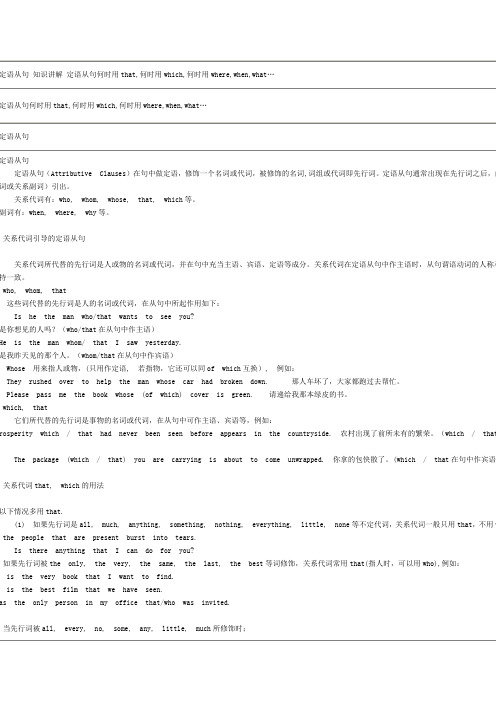
定语从句知识讲解定语从句何时用that,何时用which,何时用where,when,what…定语从句何时用that,何时用which,何时用where,when,what…定语从句定语从句定语从句(Attributive Clauses)在句中做定语,修饰一个名词或代词,被修饰的名词,词组或代词即先行词。
定语从句通常出现在先行词之后,由词或关系副词)引出。
关系代词有:who, whom, whose, that, which等。
副词有:when, where, why等。
关系代词引导的定语从句关系代词所代替的先行词是人或物的名词或代词,并在句中充当主语、宾语、定语等成分。
关系代词在定语从句中作主语时,从句谓语动词的人称和持一致。
)who, whom, that这些词代替的先行词是人的名词或代词,在从句中所起作用如下:Is he the man who/that wants to see you?是你想见的人吗?(who/that在从句中作主语)He is the man whom/ that I saw yesterday.是我昨天见的那个人。
(whom/that在从句中作宾语)Whose 用来指人或物,(只用作定语, 若指物,它还可以同of which互换), 例如:They rushed over to help the man whose car had broken down. 那人车坏了,大家都跑过去帮忙。
Please pass me the book whose (of which) cover is green. 请递给我那本绿皮的书。
)which, that它们所代替的先行词是事物的名词或代词,在从句中可作主语、宾语等,例如:rosperity which / that had never been seen before appears in the countryside. 农村出现了前所未有的繁荣。
定语从句that和where用法
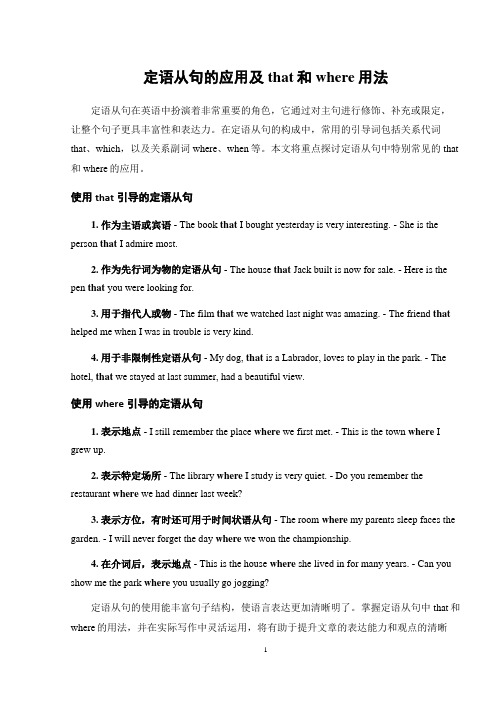
定语从句的应用及that和where用法定语从句在英语中扮演着非常重要的角色,它通过对主句进行修饰、补充或限定,让整个句子更具丰富性和表达力。
在定语从句的构成中,常用的引导词包括关系代词that、which,以及关系副词where、when等。
本文将重点探讨定语从句中特别常见的that 和where的应用。
使用that引导的定语从句1. 作为主语或宾语 - The book that I bought yesterday is very interesting. - She is the person that I admire most.2. 作为先行词为物的定语从句 - The house that Jack built is now for sale. - Here is the pen that you were looking for.3. 用于指代人或物 - The film that we watched last night was amazing. - The friend that helped me when I was in trouble is very kind.4. 用于非限制性定语从句 - My dog, that is a Labrador, loves to play in the park. - The hotel, that we stayed at last summer, had a beautiful view.使用where引导的定语从句1. 表示地点 - I still remember the place where we first met. - This is the town where I grew up.2. 表示特定场所 - The library where I study is very quiet. - Do you remember the restaurant where we had dinner last week?3. 表示方位,有时还可用于时间状语从句 - The room where my parents sleep faces the garden. - I will never forget the day where we won the championship.4. 在介词后,表示地点 - This is the house where she lived in for many years. - Can you show me the park where you usually go jogging?定语从句的使用能丰富句子结构,使语言表达更加清晰明了。
where,which,that,who,whose,what的用法.doc
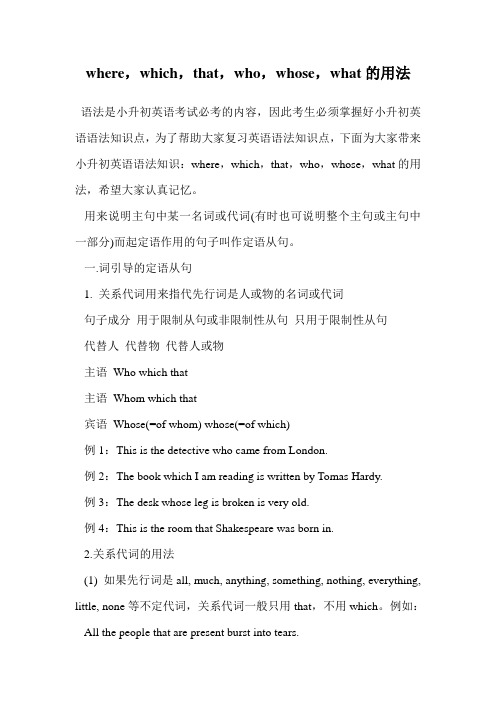
where,which,that,who,whose,what的用法语法是小升初英语考试必考的内容,因此考生必须掌握好小升初英语语法知识点,为了帮助大家复习英语语法知识点,下面为大家带来小升初英语语法知识:where,which,that,who,whose,what的用法,希望大家认真记忆。
用来说明主句中某一名词或代词(有时也可说明整个主句或主句中一部分)而起定语作用的句子叫作定语从句。
一.词引导的定语从句1. 关系代词用来指代先行词是人或物的名词或代词句子成分用于限制从句或非限制性从句只用于限制性从句代替人代替物代替人或物主语Who which that主语Whom which that宾语Whose(=of whom) whose(=of which)例1:This is the detective who came from London.例2:The book which I am reading is written by Tomas Hardy.例3:The desk whose leg is broken is very old.例4:This is the room that Shakespeare was born in.2.关系代词的用法(1) 如果先行词是all, much, anything, something, nothing, everything, little, none等不定代词,关系代词一般只用that,不用which。
例如:All the people that are present burst into tears.(2) 如果先等词被形容词最高级以及first, last, any, only, few, mush, no, some, very等词修饰,关系代词常用that,不用which, who,或whom。
例如:(3) 非限制性定语从句中,不能用关系代词that,作宾语用的关系代词也不能省略。
定语从句where,when,what,which用法
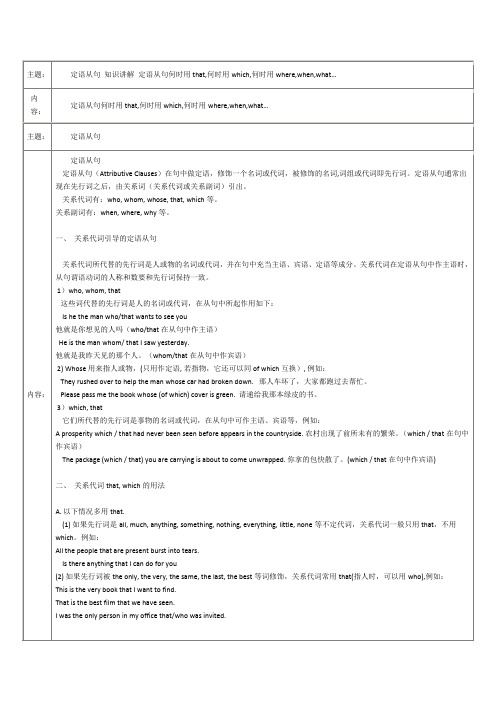
(4) 当先行词被序数词或形容词最高级所修饰时。
It is the first foreign book that I have ever seen.
This is the most beautiful flower that I have seen.
(错) I will never forget the days when I spent in the countryside.
(对) This is the mountain village (which) I visited last year.
(对) I'll never forget the days (which) I spent in the countryside.
Beijing is the place where (in which) I was born. 北京是我的出生地。
Is this the reason why (for which) he refused our offer 这就是他拒绝我们帮助他的理由吗
2)that代替关系副词
that可以用于表示时间、地点、方式、理由的名词后取代when, where, why和"介词+ which"引导的定语从句,在口语中that常被省略,例如:
Charles Smith, who was my former teacher, retired last year.
查理史密斯去年退休了,他曾经是我的老师。
My house, which I bought last year, has got a lovely garden.
英语中的定语从句用法

英语中的定语从句用法定语从句是英语中非常重要的一种句子结构,它能够为主句提供更多的信息,使句子更加丰富和准确。
在学习和运用定语从句时,我们需要掌握一些基本的用法和注意事项。
一、定语从句的引导词定语从句通常由关系代词或关系副词引导。
关系代词包括that, which, who, whom, whose等,而关系副词则包括where, when, why等。
在选择引导词时,我们需要根据引导词在定语从句中的作用来决定。
1. 当引导词在定语从句中作主语时,我们可以使用关系代词who, which或that。
例如:The girl who is standing over there is my sister.(那个站在那边的女孩是我妹妹。
)2. 当引导词在定语从句中作宾语时,我们可以使用关系代词whom, which或that。
例如:I have a friend whom I can always rely on.(我有一个朋友,我总是可以依靠他。
)3. 当引导词在定语从句中作介词的宾语时,我们可以使用关系代词whom, which或关系副词where, when等。
例如:This is the hotel where we stayed last summer.(这是我们去年夏天住过的酒店。
)二、定语从句的位置定语从句可以出现在主句的前面或后面,具体位置取决于定语从句的内容和语境。
当定语从句的内容对于理解主句非常重要时,我们通常将其放在主句的后面。
例如:I bought a book that was recommended by my teacher.(我买了一本被我的老师推荐的书。
)另外,当定语从句的内容对于理解主句并不是非常重要时,我们通常将其放在主句的前面,并用逗号与主句隔开。
例如:The weather being fine, we decided to go for a picnic.(天气很好,我们决定去野餐。
when引导的定语从句的用法
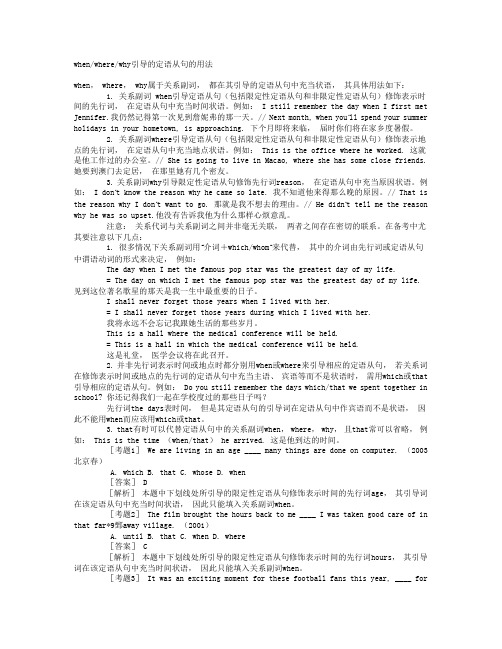
when/where/why引导的定语从句的用法when, where, why属于关系副词,都在其引导的定语从句中充当状语,其具体用法如下:1. 关系副词 when引导定语从句(包括限定性定语从句和非限定性定语从句)修饰表示时间的先行词,在定语从句中充当时间状语。
例如: I still remember the day when I first met Jennifer.我仍然记得第一次见到詹妮弗的那一天。
// Next month, when you’ll spend your summer holidays in your hometown, is approaching. 下个月即将来临,届时你们将在家乡度暑假。
2. 关系副词where引导定语从句(包括限定性定语从句和非限定性定语从句)修饰表示地点的先行词,在定语从句中充当地点状语。
例如: This is the office where he worked. 这就是他工作过的办公室。
// She is going to live in Macao, where she has some close friends. 她要到澳门去定居,在那里她有几个密友。
3. 关系副词why引导限定性定语从句修饰先行词reason,在定语从句中充当原因状语。
例如: I don’t know the reason why he came so late. 我不知道他来得那么晚的原因。
// That is the reason why I don’t want to go. 那就是我不想去的理由。
// He didn’t tell me the reason why he was so upset.他没有告诉我他为什么那样心烦意乱。
注意:关系代词与关系副词之间并非毫无关联,两者之间存在密切的联系。
在备考中尤其要注意以下几点:1. 很多情况下关系副词用“介词+which/whom”来代替,其中的介词由先行词或定语从句中谓语动词的形式来决定,例如:The day when I met the famous pop star was the greatest day of my life.= The day on which I met the famous pop star was the greatest day of my life.见到这位著名歌星的那天是我一生中最重要的日子。
定语从句 where,when,what,which用法
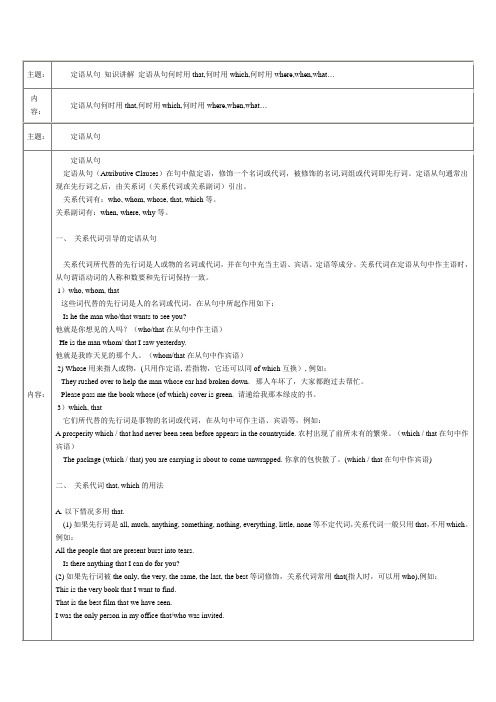
二、关系代词that, which的用法
A.以下情况多用that.
(1)如果先行词是all, much, anything, something, nothing, everything, little, none等不定代词,关系代词一般只用that,不用which。例如:
关系词的选择依据在从句中所做的成分,先行词在从句中做主、定、宾语时,选择关系代词(who, whom, that, which, whose);先行词在从句中做状语时,应选择关系副词( where地点状语,when时间状语,why原因状语)。
五、限制性和非限制性定语从句
1)定语从句有限制性和非限制性两种。限制性定语从句是先行词不可缺少的部分,去掉它主句意思往往不明确;非限制性定语从句是先行词的附加说明,去掉了也不会影响主句的意思,它与主句之间通常用逗号分开,例如:
His father died the year (that / when / in which) he was born.
他父亲在他出生那年逝世了。
He is unlikely to find the place (that / where / in which) he lived forty years ago.他不大可能找到他四十年前居住过的地方。
主题:
定语从句知识讲解定语从句何时用that,何时用which,何时用where,when,what…
内容:
定语从句何时用that,何时用which,何时用where,when,what…
定语从句句式

定语从句句式定语从句定义:在复合句中修饰名词或代词的从句;被修饰的名词或代词叫先行词。
种类:关系代词:who、whom、whose、which、that关系副词:where、when、why准关系代词:as、but、than复合关系代词:what、whatever、whoever、whichever一、关系代词引导的定语从句(1)由who引导的定语从句:1.关系代词who用作主语,指人或动物;2.who;不能用作表语;(2)由who引导的定语从句:1.关系代词whom用作宾语,指人;2.whom不能用作表语;(3)由whose引导的定语从句:1.关系代词whose作定语,既可指人也可指物。
2.whose用于引导定语从句时,有“whose=of which”(4)由which引导的定语从句:1.关系代词做主语、谓语动词或介词的宾语,指物或动物;2.常用关系代词which作表语,既可指人也可指物,“人”要具有某种特性;3.which既能引导限制性定语从句,也能引导非限定性定语从句;(5)由of which/whom引导的定语从句:1.名词、不定代词、数量词+of which/whom2. of which/whom从句中作主语有两种形式:数词、名词+of which/whom 或of which/whom+数词、名词3.“名词+of which”做主语时常用“whose+名词”取代;4.of which所修饰的名词前应加上定冠词;(6)由介词+which+抽象名词引导的定语从句:1.在非限制性定语从句中,以“介词+which+抽象名词”结构补充说明,which作定语;2.the way后接定语有三种形式:不加;加that;加in which;(7)由that引导的定语从句:1.关系代词that在从句中作主语或宾语,不作介词宾语,既指人也指物;2.先行词是不定代词时,必须用that引导定语从句;3.先行词被不定代词修饰时,必须用that引导定语从句;4.先行词被序数词或形容词最高级修饰时,必须用that引导定语从句;5. 先行词既有人又有物时,必须用that引导定语从句;6. 先行词被the only、the same、the last修饰时,必须用that 引导定语从句;7.以who、which引起的问句中,为避免重复,常用that引导定语从句;8.用作关系副词以修饰表示时间的名词时,常用that代替when 引导定语从句;9.构成非限制性定语从句时,不用that;10关系代词前有介词且指物时,不用that;11.先行词本身是that时,不用that;12.关系代词之后有插入成分时,不用that;二、关系副词引导的定语从句(1)由when的定语从句:1.关系副词when是兼有连词作用的副词,常用于表示时间;2.先行词为表示时间的名词;3在口语中,先行词为表示时间的名词时,可以省略when;4先行词在从句中起副词作用作时间状语时,用when引导定语从句;先行词在从句中起代词作用作宾语时,用which/that引导定语从5.在this/that/it’s后可省略先行词the time;6.现代英语口语中,the day when、the time when、the moment when可用that代替;;7.关系副词when可用恰当的“介词+which”代替;(2)由where引导的定语从句:1. 关系副词where是兼有连词作用的副词,常用于表示地点;2.先行词为表地点或有地点含义的抽象名词;3.在口语中,先行词是place、room等词时,可以省略where;4.先行词在从句中起副词作用作地点状语时,用where引导定语从句;先行词在从句中起代词作用作宾语时,用that/which引导定语从句;5. 在this/that/it’s后可省略先行词the place;6. 现代英语口语中,the place where可用the place that代替;7. 关系副词where可用恰当的“介词+which”代替;(3)由why引导的定语从句:1. 关系副词why兼有连词作用的副词,常用于表示原因;2.先行词只有reason;3.在口语中,可以省略why;4.先行词reason在从句中起副词作用表原因时,用why引导定语从句;先行词reason在从句中起代词作用作宾语时,用that/which引导定语从句;5.在this/that/it’s后可省略先行词the reason;6.现代英语口语中,the reason why可用the reason that代替;7. 关系副词why可用恰当的“介词+which”代替;(4)由介词+where/when引导的定语从句:1.from where引导的定语从句中,where代表主句提供的地点;2.since/by when引导的定语从句中,when代表主句提供的时间三、准关系代词引导的定语从句(1)由准关系代词as引导的限制性定语从句:1.as既可作引导状语从句的连词,也可作引导定语从句的关系代词;2.在such…as引导的定语从句中,as在从句中作主语或表语;3.在the same…as引导的定语从句中,as在从句中作主语或宾语;4.在as…as引导的定语从句中,as在从句中作主语;5.区别:such…as引导定语从句,such…that引导结果状语从句;6.区别:the same…as指两物相似,the same…that描述的是同一物;(2)由准关系代词as引导的非限制性定语从句:1.as代表主句或主句一部分的意思,不能指代某个名词或代词;2.在as引导的非限制性定语从句中,as可以放在主句的任意位置,在从句中作主语或宾语;3.主句表否定,as引导的定语从句位于主句之后时,as指代的主句不表否定,可用but代替;4.主句表否定,as引导的定语从句位于主句之前时,as指代的主句仍表否定意义;5非限制性定语从句中,which引导的从句不能放在主句前,as 引导的从句可放在主句前后.;6.非限制性定语从句中,as/which用作关系代词时都可指代一个句子,但as有“就像”之意;7.非限制性定语从句中,当从句的谓语动词时be动词或连系动词时,as/which都可作主语;8.非限制性定语从句中,当从句的谓语动词是行为动词时,只能用which作主语;9.非限制性定语从句中,as可作连词引导状语从句,构成“as+过去分词”形式,表定语义;(3)由准关系代词but引导的定语从句:1.but本身含有否定义,相当于who/which/that…not;2.but的先行词往往是有否定义的代词或名词词组,通过双重否定表强烈肯定;3.but用于定语从句中作主语,此时谓语动词的数要与先行词一致,时态要与主句一致;4.but用于引导状语从句时,有“but=that...not”(4)由准关系代词than引导的定语从句:1.than引导的定语从句中,谓语动词的数和时态必须与被比较级修饰的先行词一致;2.than引导的状语从句中,用作连词的than可兼作关系代词在主句中作主语,than指代主句;3.than引导的状语从句中,构成“than+过去分词”结构,than 后省略了形式主语it、动词be;四、复合关系代词引导的定语从句(1)复合关系代词what引导的定语从句:1.定语从句中,what是由先行词和关系代词组成的复合词,是兼作先行词的关系代词;2.what用于指人时,what=the person that;what用于指物时,what=the thing(s) which;3.what在定语从句中起名词作用时,可作主语、宾语、表语;4.what在定语从句中起形容词作用时,修饰名词,意为“仅有的”;5.what在定语从句中起形容词作用时,常与few、little连用,意为“尽管不多,但已全部”;6.what引导的名词性从句中,无疑问义,可作从句的主语、宾语、介宾、宾补;7.what用于表比喻义的特殊结构:A is to B what C is to D;8.what组成的常用短语:What if…? 如果…怎么样?What of it?那又怎么样?(2)复合关系代词whoever,whomever,whichever,whatever引导的定语从句:1.whoever、whomever、whichever、whatever具有名词功能,引导名词性从句;2.whoever、whomever、whichever、whatever指代未知的人或物,在从句中作主语或宾语;3.whichever、whatever在名词性从句中兼起形容词作用,修饰从句中名词,意为“仅有的”;4. whoever、whichever、whatever在名词性从句中兼起副词作用,引导让步状语从句;五、关系代词的省略1.当关系代词在定语从句中作宾语时往往省略;2.当关系代词在定语从句中作表语时,用that且往往省略;3.当先行词为不定代词时,往往不用关系代词;4.当定语从句为there be句型时,往往不用关系代词;5.当主句为there be句型时,实际主语后若带有定语从句,作主语的关系代词有时省略;六、插入语(1)分句用作插入语:I believe、I find、I hear、I imagine、I remember、I think、I sup pose…(2)状语分句作插入语:1.可作插入语的状语分句有:as far as I know、as I told you before、if you like…2.省略形式的状语分句作插入语:if ever、if possible、if any…(3)what构成的惯用插入语:1.“what+be+比较级形容词”结构,意为“而且,尤有甚者“;2.“what we call,what is called”,意为“所谓的”;3.“what+…”的类似结构:what we consider、what you refer to as、what is referred to as…例句:This is the man who helped me.(who在从句中作主语)The doctor whom you are looking for is in the room.(whom 在从句中作宾语)Do you see the house whose windows are all broken?(whose在从句中作定语)The building which stands near the river is our school.(which在从句中作主语)This is the book (which) you want.(which在从句中作谓语动词的宾语)The room in which there is a machine is a workshop.(which 在从句中作介宾)The war killed 1000 people, most of which were very young.(“不定代词+of which”的形式)The committee consists of 20 members, five of whom are women.(“数量词+of whom”的形式)Do you see the house the windows of which are all broken?(“名词+of which”作主语结构之一)Do you see the house of which the windows are all broken? (“名词+of which”作主语结构之二)It rained all night, during which time the ship broke in pieces.(“介词+which+抽象名词”结构)That’s the way (/) he spoke.(the way后接定语的形式之一)That’s the way that he did it. (the way后接定语的形式之二) That’s the way in which you answered the question. (the way后接定语的形式之三)。
- 1、下载文档前请自行甄别文档内容的完整性,平台不提供额外的编辑、内容补充、找答案等附加服务。
- 2、"仅部分预览"的文档,不可在线预览部分如存在完整性等问题,可反馈申请退款(可完整预览的文档不适用该条件!)。
- 3、如文档侵犯您的权益,请联系客服反馈,我们会尽快为您处理(人工客服工作时间:9:00-18:30)。
定语从句用where when that when或which填空:
1 I like a place_there are beautiful views.
2 My sister has gone to
a place_is called “Stone Forest”.
3 Have you ever heard of a place _is famous for its fish and rice.
That’s my hometown _we were born and grew up.
4 I’d like to go a place _has a lot of flowers and trees.
5 All of us want to go to a place _there are a lot of flowers and trees.
6 They had a
wonderful vacation at a place _ they did a lot of outdoor activities.
7 I want to go somewhere _is good for me to study.
8 She wants to go somewhere _ she can learn English well.
9 I hope to retire somewhere _the
weather is always warm.
10 Teenagers would like to go somewhere _ is fun .
11 This is the school _ I studied 5 years ago.
12 Look at the school _is so nice.
13 Both my parents worked at the factory
_is famous.
14 Both of his parents visited the factory _they worked together.
15 We miss the old days _we spent in playing games.
16 We miss the old days _we spent time in playing games.
17 They remembered
the old days _they had
a good time.
18 Don’t forget the time _was hard for us, because it’s the important experience for our life.
19 It’s a good time for us _we could watch TV or movies together.。
